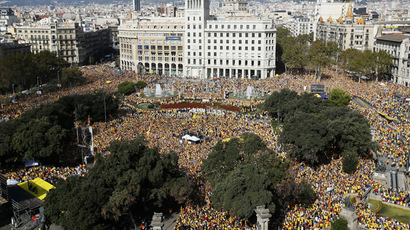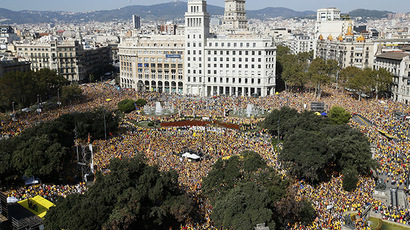Homage to Catalonia: People defy Madrid casting ballots in symbolic independence vote
High numbers of Catalan voters are determined to take part in the highly-anticipated symbolic poll on Sunday on whether to split from Spain and become an independent country.
"People seem extremely enthusiastic. If you walk through the
streets in Barcelona that energy is palpable," RT's Marina
Portnaya reported, adding that banners, posters and ribbons are
being displayed throughout the city in support of Catalonia's
“consultative vote.”
Organizers told RT that over 1,300 polling centers have been set
up for what is expected to be a "high turnout." There's also been
an army of volunteers, up to 50,000 people, making phone calls to
people living across Catalonia, informing them where to go and
how to vote.
More than 1300 voting locations are operating as Catalans cast ballots for independence poll #9N2014#CataloniaVotespic.twitter.com/cdaRmZIVfm
— marina portnaya (@portnayanyc) November 9, 2014
Regional police are on high alert, but organizers believe that
officers are unlikely to stand in their way or to block voters
from casting their ballots.
There have been several challenges that organizers and volunteers
have faced, leading up to the consultative vote, Portnaya said.
"Madrid sent letters to the public schools that are serving
as polling sites, threatening them, saying that it's illegal for
schools to take part in an election, even though this is a
non-binding unofficial consultation vote."
Many pro-independence volunteers received robot calls all day
long on Saturday, Portnaya reported, in an apparent effort to
monopolize their mobile phones and drain their batteries to
prevent them from using them.
As of 1800 (6pm), 1,977,531 Catalans voted in the non-binding poll for independence. #Catalonia#9N2014
— marina portnaya (@portnayanyc) November 9, 2014
After Spain's High Court ruled the independence referendum
proposed by Catalan leader Artur Mas unconstitutional last month,
the Madrid government has also issued a ban on the informal poll,
forbidding Catalans from making any public show of support for
independence.
Thousands rallied in front of the National Museum of Catalonia on
Friday, however, in an effort to show resolve to stage the
November 9 so-called "consultative vote," despite warnings from
Spanish PM Mariano Rajoy's government to disrupt it.
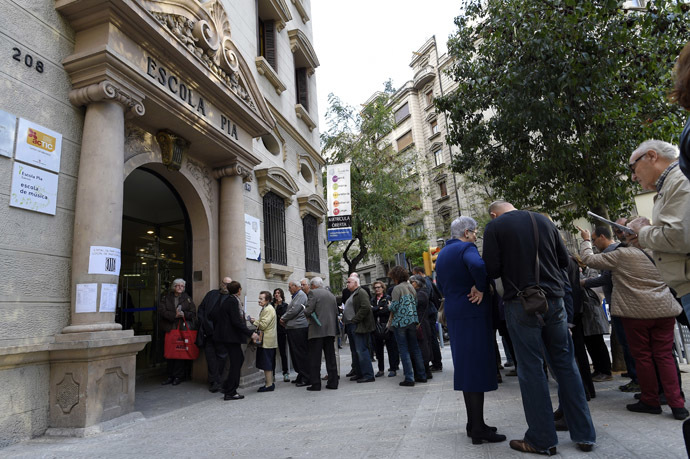
READ MORE: Catalans gear up for symbolic independence vote Sunday defying Madrid’s ban
Rajoy said ahead of the vote: “The law will be enforced.
There will be no referendum that calls into question the
sovereignty of the Spanish nation. There will be no division of
Spanish territory while I am prime minister.”
However, according to opinion polls, up to 80 percent of Catalans
want more autonomy from Spain, with about 50 percent backing full
independence. With its own language and culture, the
comparatively well-off autonomous region has a population of 7.5
million and accounts for nearly one-quarter of Spain’s GDP.
“According to the organizers...within the first four hours of
polls being opened, nearly 1,143,000 Catalans turned out to vote
– that’s just in the first four hours. Polls will be open for 11
hours. So clearly that is an indication that many are coming out
to cast their ballots," Portnaya stated.
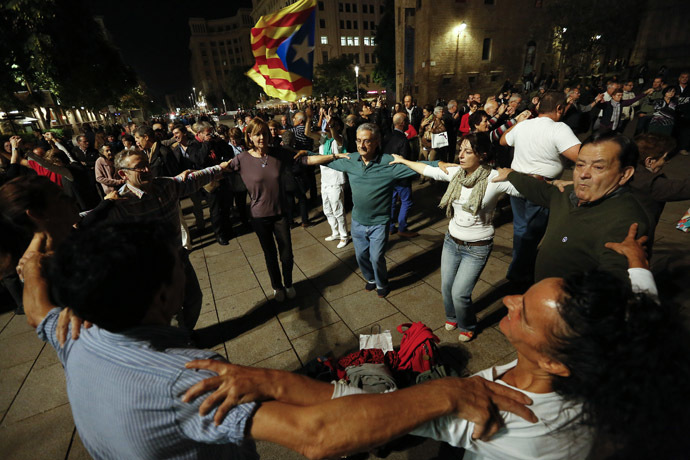
The polls look set to draw up to 1.5 million people, to whom the
vote is about protecting their right to freedom of expression.
Thousands of residents in northeast Spain have been showing their
support for the poll, with call centers run by volunteers being
set up to draw more and more people into the vote, RT’s Marina
Portnaya reported. Over 40,000 volunteers will help set up voting
stations Sunday.
It's hoped that a high level of support could at least bring
central government to the negotiation table on such issues as tax
and political autonomy.
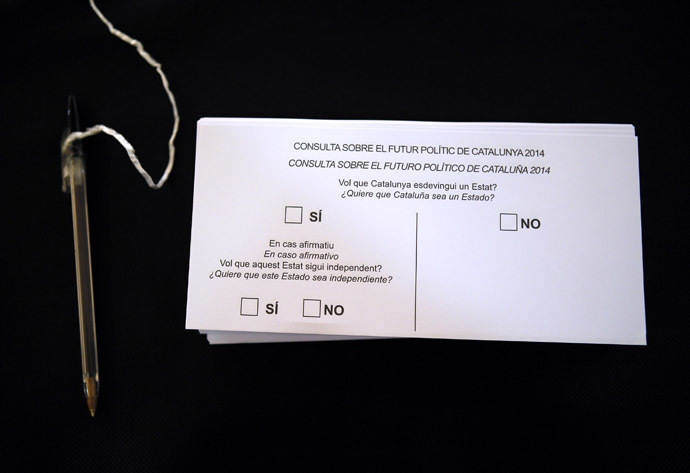
Catalans will be able to vote in the poll simply by showing up
and registering. Given that the vote won't be officially
organized, due to a ban on "preparatory activities,"
municipalities can reserve the right not to stage the poll.
"It's not a referendum or a consultation or anything that
resembles that," Rajoy said, criticizing the symbolic vote.
But even as Rajoy urged Catalans to "return to sanity"
on Saturday, the spokesman for the Catalan regional government,
Francesc Homs, said that Spanish judiciary have pledged that no
one will be able to "ban citizens’ freedom of
expression."
“Of course the economic crisis in Spain and all of Europe is one of the big driving forces of this call for independence, with Spain having unemployment at or above 25 percent and Barcelona being the wealthiest region of Spain," Portnaya said.
"You have many Catalans urging and wanting more fiscal independence – they say that they pay much more into the state than they receive back – and Catalonia does account for more than 20 percent of Spain’s GDP. They believe that if they are the ones earning, they should be the ones deciding how their money is being spent," she added.
The vote went very positively – as expected, Anna Arque of the
European Partnership for Independence told RT.
“With massive participation and always with a smile on the faces
of Catalan people,” Arque said. “The situation is that
for Catalans this referendum already could be legal because
there’s an international legality and also a Catalan
legality.”
“What happens is that again Spain opposes us – they are the
ones saying this referendum is illegal, and unfortunately the
Catalan government accepted the decision of the Spanish court…but
still what happens is that it is the people who are continuing to
show the world our determination”.
Arque wants elections to be called tomorrow, “so we have a
President that is going to take forward the sovereignty of
Catalonia,” she said.
Polls close at 9pm.













